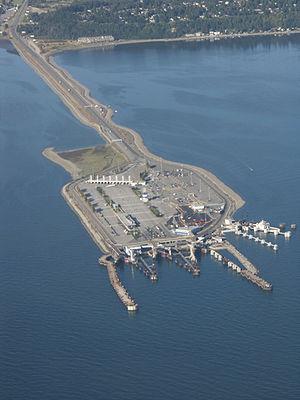Tsawwassen ferry terminal
Tsawwassen | |
|---|---|
| Ferry terminal | |
 Tsawwassen ferry terminal from the air | |
| General information | |
| Location | 1 Ferry Causeway Delta, British Columbia Canada |
| Coordinates | 49°00′31″N 123°07′44″W / 49.0086567°N 123.1289291°W |
| Owned by | BC Ferries |
| Operated by | BC Ferries |
| Line(s) | Route 1–Swartz Bay Route 9–Long Harbour Route 30–Duke Point |
| Bus stands | 2 |
| Bus operators | Coast Mountain Bus Company |
| Connections | |
| Construction | |
| Parking |
|
| Accessible | Yes |
| Other information | |
| Station code | TSA[1] |
| Website | www |
| History | |
| Opened | June 15, 1960 |
| Passengers | |
| 2023 | 4 516 501[a] |

Tsawwassen is a ferry terminal and a major transportation facility in Delta, British Columbia, part of the BC Ferries system and Highway 17. Positioned less than 500 metres (1,600 ft) from the 49th parallel along the Canada–United States border,[2] it is located at the southwestern end of a 2-kilometre (1.2 mi) causeway that juts out into the Strait of Georgia off the mainland at the community of Tsawwassen. With an approximate size of 23 hectares (57 acres), it is the largest ferry terminal in North America.[citation needed]
History
[edit]
In the late 1950s, the search for a mainland ferry terminal that would connect British Columbia's Lower Mainland with the Victoria area on Vancouver Island involved extensive scouting of locations, from Steveston to White Rock. Despite concerns of rough seas and bad weather, the favoured site soon became the area offshore from the Tsawwassen First Nation reserve.
Construction of the terminal began in 1959, after BC Transportation Minister Phil Gaglardi, on divided engineering advice, selected the site. Construction of an artificial island began, and the causeway was built from the island back towards the mainland.[3] The endeavour used an estimated 2.3 million cubic metres (3.0 million cubic yards) of boulder, rock, and gravel fill.[4]
To connect Highway 99 to the new terminal, an 11-kilometre-long (6.8 mi) highway was constructed near the southern end of the Deas Tunnel and through the edge of Ladner and became a portion of Highway 17. The terminal opened on June 15, 1960.[5]
In the mid-1990s, a major renovation and expansion of the terminal was undertaken.
Issues
[edit]The isolated causeway location of the terminal was criticized locally in its formative years but has allowed and continues to allow terminal expansion to cope with growing vehicle traffic.
In 2003, the Tsawwassen First Nation filed legal action in the BC Supreme Court over the destruction of the foreshore and other concerns caused by the impact of the terminal and the nearby Roberts Bank Superport.[6] Concerns were also expressed in 2005 about eutrophication, or destructive bacterial buildup, in the waters between the terminal and the Roberts Bank facility.[7]
Ferry facilities and connections
[edit]Currently, there are five berths at the Tsawwassen ferry terminal. The terminal primarily serves routes travelling to the Swartz Bay ferry terminal, north of Victoria, and the southern Gulf Islands.
On May 1, 1990, a connection from Tsawwassen to Nanaimo called the "Mid-Island Express" was established,[8] providing the fastest surface connection between Northern Vancouver Island and the border with the United States at Blaine, and, since the opening of the South Fraser Perimeter Road, to the Fraser Valley and points east. The route ran to Departure Bay until 1997, when the Duke Point ferry terminal opened.
The quickest path between the terminal and Active Pass, for ferries travelling to the Gulf Islands or to Swartz Bay, passes over approximately 8 km (5 mi) of United States waters in the Strait of Georgia.
The terminal is served by public transportation through TransLink's 620 bus route.
See also
[edit]- Duke Point ferry terminal
- Departure Bay ferry terminal
- Horseshoe Bay ferry terminal
- Earls Cove ferry terminal
- Roberts Bank
- Roberts Bank Superport
Notes
[edit]- ^ Figures obtained for 2022 & 2023 from adding the passengers counted at Tsawwassen from the routes 1, 9, and 30 in each month of the calendar year.[1] The figures under "Total Prev Year" are not used because those denote fiscal years instead of calendar years. The total passenger count at Tsawwassen for 2022 was 4 144 989.
References
[edit]- ^ a b "Plans, Reports, Policies and Other Resources". Connecting the Coast. BC Ferries. Retrieved 2023-08-22.
- ^ "Tsawwassen Ferry Terminal" (Map). Google Maps. Retrieved 11 August 2020.
- ^ Bannerman, Gary; Bannerman, Patricia (1985). The Ships of British Columbia. Hancock House Publishers Ltd. p. 54.
- ^ "BC Ferries website - Milestones". Archived from the original on 2006-07-17. Retrieved 2007-03-14.
- ^ "New Ferries 'In Business'". Victoria Daily Times. June 15, 1960. p. 1. Retrieved October 11, 2022 – via Newspapers.com.
- ^ "Ferries, port face suit". Delta Optimist. 11 December 2003. Archived from the original on September 27, 2007.
- ^ Gulyas, Maureen (June 25, 2005). "Residents going APE over port expansion". Delta Optimist. Archived from the original on October 30, 2006.
- ^ Staff Writer (May 1, 1990). "Daybreak". The Province. Retrieved August 23, 2022 – via ProQuest.

